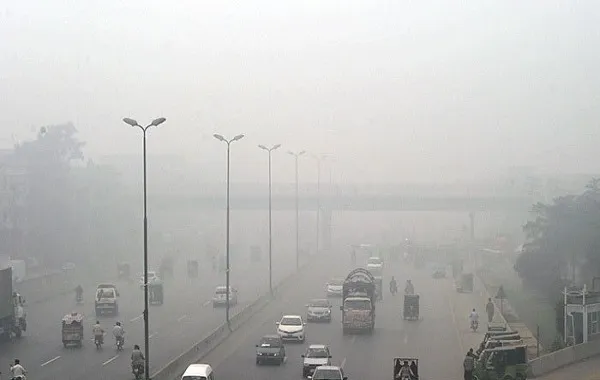As harmattan season sets in
The harmattan season, which is characterised by dry and dusty wind on the Atlantic coast of Africa, is already upon us. The season, occurring between November and March, or even earlier in some northern states in Nigeria, usually comes with attendant consequences. During harmattan, we see a spike in cases of cold, as well as […]

The harmattan season, which is characterised by dry and dusty wind on the Atlantic coast of Africa, is already upon us. The season, occurring between November and March, or even earlier in some northern states in Nigeria, usually comes with attendant consequences.
During harmattan, we see a spike in cases of cold, as well as respiratory diseases such as asthma and bronchitis, which are made worse by air pollution. The weather, at this time also, is very unfriendly to the skin, leaving many with cracked lips and soles of the feet.
The aviation industry also bears the brunt as flights are delayed, rescheduled, diverted or cancelled for days on end due to poor visibility occasioned by the dusty wind. This reduced visibility puts even those travelling by road at risk.
Fire outbreaks also become prevalent at this time as a result of the dry wind, leading to loss of lives and property. Just last week, at Tsangaya Model Boarding Primary School in Kanwa village, Madobi Local Government of Kano State, about 14 hostels of the school were burnt in a fire accident. Similarly, at Rumuchakara village, Choba, in Obio/Akpor Local Government of Rivers State, four children lost their lives in a fire accident in their home. Badume market, one of the biggest markets in Bichi Local Government Area also went up in flames where three people were confirmed dead and more than hundred shops burnt. And just yesterday, the Singer market in the Kano metropolis was gutted by fire.
There are several cases of fire disaster recorded in the past across the country, from Kantin Kwari market in Kano, Katsina central market, and the Balogun market fire in Lagos State.
In many communities today, people still engage in bush burning in the name of clearing their farms or hunting for bushmeat. Sometimes fires are started by burning of refuse dumps. Dry wind usually makes fires get out of control and spread very quickly, resulting in massive destruction of crops and vegetation cover.
The use of candles to beat darkness in times of power outages is also common, despite the risks. People need to know the consequences of their actions and inaction and apply caution.
In places, where the use of electrical appliances is common, people should exercise caution both at home and in public places, such as markets, schools, hospitals, etc. Some use water heaters and rather than remain around to monitor it, they get distracted in the process, which leads to fire incidents. Electrical appliances should be switched off whenever they are not in use as electricity distribution companies also experience glitches that lead to fire outbreaks in homes.
Governments at the local, state and federal levels should sensitise the general public to take precautionary measures to avoid fire incidents, or lessen their impact when they occur. Disaster management and local authorities should enlighten the public on the handling of fires during this period. Community leaders should also be involved to educate their subjects on the measures to avoid fire disasters.
The various fire services nationwide should be properly equipped and put in a position to respond to emergencies promptly. It is inexcusable that in an environment prone to fire outbreaks, neighbourhoods do not have standard water hydrants and other firefighting equipment in place and fire services rarely have water or vehicles to facilitate their job. Planning has also been relegated especially at the local government level. There is a need to install water hydrants in strategic areas of towns and cities to aid fire emergency response.
People should keep firefighting equipment such as fire extinguishers, smoke detectors and fire alarms in their homes. This will make the job of firefighters easier.
For the aviation industry, the relevant regulatory bodies must ensure that airline operators keep to the best practices at all times. The airlines and pilots, on their part, also need to exercise maximum restraint. They must abide by all the rules governing flight operations. Under no condition should any aircraft take off or land when the minimum weather condition for such operation is not met. The safety of air passengers must outweigh the drive for profit.
They should also leverage the use of technology, to help pilots and other stakeholders in the aviation industry. The instrument landing system (ILS), for example, provides short-range guidance to aircraft to allow them to approach a runway at night or in bad weather.
In the area of health, people, particularly children and the elderly, who are more vulnerable, should wear warm clothing to minimise the likelihood of contracting these communicable diseases during the harmattan. The skin should also be kept moist by application of oily creams.
Those with respiratory ailments should avoid dust as much as possible. People should also drink enough water and other fluids to stay hydrated as water is lost from the body into the atmosphere through perspiration and urinating.
Governments and all relevant authorities must play their roles without fear or favour by enforcing standard safety measures. The indiscriminate use of fireworks, especially as the Christmas celebration is around the corner, must be regulated, if not banned completely. We must not keep recording losses in both human and material resources with each passing harmattan season.
